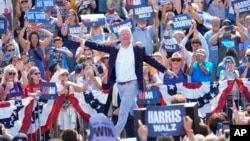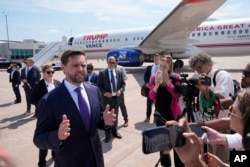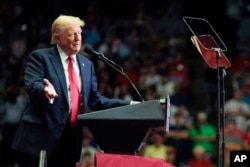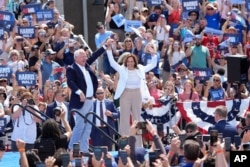The two U.S. presidential campaigns crossed paths Wednesday in Eau Claire, a small city of 71,000 in the crucial political battleground state of Wisconsin, which both need to win in the November election.
Republican vice-presidential candidate JD Vance stopped in Michigan first, then headed to neighboring Wisconsin to talk to workers at a factory. Both states are in the upper Midwest.
Democratic presidential nominee Kamala Harris and her new vice-presidential running mate, Tim Walz, weren't far behind, staging a raucous outdoor rally ahead of an evening appearance in Michigan.
The two campaigns were in such proximity in Eau Claire that Vance walked over to see Vice President Harris' Air Force Two on the local airport tarmac, quipping to reporters, "We landed about the same time that she did, and I went over there because I thought it might be nice to check out this plane that's going to be mine in a few months."
He also jabbed at Harris, adding, "I want to go and say hello to the journalists who are traveling along with the vice president, because I figured they must be lonely because Kamala Harris doesn't take any questions."
At the factory, Vance accused Harris of dodging reporters' questions for 17 days — ever since President Joe Biden ended his reelection bid and endorsed Harris to take his place as the Democratic standard bearer against former President Donald Trump.
Earlier in the day, Trump, on a call to the "Fox & Friends" show, described Harris' selection Tuesday of Walz, the liberal governor of another Midwest state, Minnesota, as a "shocking pick."
"I could not be more thrilled," Trump declared. Both he and Vance have characterized Walz and his policies as liberal and out of the mainstream of American politics.
Walz and Harris zeroed in on attacking Trump at their own rally, where the crowd broke into frequent chants of "Kamala" and "VP Walz."
Harris contended that Trump, in a new four-year term starting in January, would cut protections for the country's middle-class families, a demographic she and Walz have been heavily focusing on.
Trump, Harris argued, would cut government-run health insurance and pensions for older Americans, something he has denied he would do, while giving "tax breaks to billionaires and big corporations."
She also attacked Trump for his appointment of three Supreme Court justices who in 2022 helped overturn the nearly five-decade-old constitutional right to an abortion in the United States. Harris said she would sign legislation to restore abortion rights throughout the U.S. if Congress passes legislation to legalize it again.
"Donald Trump intends to take our nation backward," she said, as the crowd chanted, "Not going back."
Six or seven battleground states like Wisconsin are likely to dominate the travels of all four of the presidential and vice-presidential candidates leading up to Election Day on November 5. Early voting in some states starts in the last two weeks of September.
The highly contested states play an outsized role in determining the outcome of the election because the U.S. does not pick its president or vice president by the national popular vote.
Rather, the election is 50 state-by-state contests, with electors for the winning ticket in all but two states casting all of their votes in the Electoral College either for Harris-Walz or Trump-Vance. Electoral College votes are based on population, so the most populous states hold the most sway.
National polls now show Harris edging slightly ahead of Trump, reversing the lead he held over Biden.
But the outcome is highly in doubt.
The closeness of the race was shown by a new poll of Wisconsin voters, with the Marquette University Law School saying that, among likely voters, Harris is the choice of 50% and Trump the choice of 49%.
Wisconsin has 10 of the 270 electoral votes that are needed for victory, while more populous Michigan has 15.







